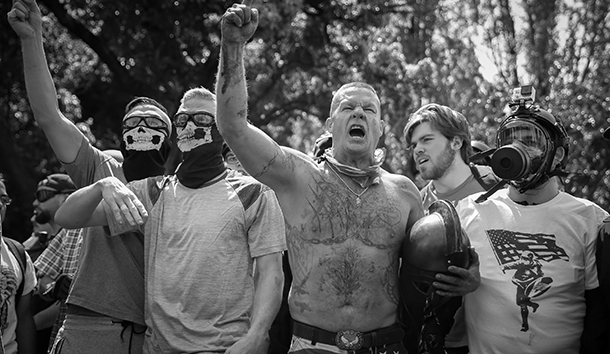“Free speech!” has been the rallying cry of Republicans and conservatives for months on end. This really ought to stop.
Milo, Gavin McInnes, Ann Coulter: These conservative and libertarian provocateurs have been met with radical opposition from roving gangs of snowflake thugs who set things on fire, break glass, pepper-spray bystanders—all in order to keep the aforementioned speakers from speaking. They shout “fascist” and “racist” and a wide variety of scatological vulgarities in order to drown out any reasoned opposition to their utopian fantasies of free love, free college, free borders, and free pronouns on college campuses. They deface buildings, bully, and intimidate, while campus security and policemen obey politicians’ orders to “stand down,” lest a hungry smartphone or a network-news camera grab a few seconds of law-enforcement officers enforcing the law.
This is, by definition, utter lawlessness. Conservatives are right to cry foul when vandalism, disturbing the peace, and assault are tolerated. But why are they suddenly basking in the icy embrace of the likes of Whoopi Goldberg and Bill Maher—celebrities who hate them and everything they stand for?
Free-speech solidarity (I disapprove of the hate you Nazis spew, but I’ll defend your right to spew it on The View) is the answer. But do conservatives really share this “core value” with left-liberals? Or could it be that, by pounding the drums for free speech, conservatives have adopted one of the left-liberals’ core contradictions?
The First Amendment has been violently abused for so long that it may be permanently disfigured. Like Rocky Balboa, it has been pummeled so hard that it can barely speak for itself. Incorporated beyond recognition, it has been Larry Flynted and ACLU’d to the brink of sweet death. But in its youth, when its features were still recognizable, it had nothing to say about speeches on college campuses, let alone smutty books or Facebook ads. It didn’t even say anything comprehensive or absolute about “abridging the freedom of speech.” “Congress shall make no law” referred to the federal Congress—no one else.
That ship sailed long ago, some might suggest. But no conservative should repeat along with Bill and Whoopi and Richard Dreyfuss and Jack Weinberg the absurd notion that the Founding Fathers envisioned a country where anyone could say whatever he wants, whenever he wants. The Framers and Ratifiers of the Constitution were not enshrining some abstract natural right of “free speech” and placing within the power of the federal government the authority to use coercion to defend such a right wherever and whenever it might be violated. They were protecting political speech from the predations of distant, concentrated national power. The Jeffersonians understood the partisan Sedition Act (1798)—by which Congress outlawed any attempt even to “utter” something “scandalous and malicious” about the federal government, making it a crime punishable by a fine up to $5,000 and imprisonment for “six months to five years”—to be a clear violation of the First Amendment. But if Yale officials had refused some traveling speaker the right to raise hackles on campus, no one would have made a federal case of it; the incident would have had nothing to do with the Constitution, nor the Constitution with it.
For the enshrinement of “free speech” as it is now understood, we have to turn to the U.N.’s Universal Declaration of Human Rights, which sought to fulfill the leveling dreams of those seated to the left in the Estates General. In that document—a utopian fantasy that is not an organic part of our common-law history—there is no room for the authority of any of Edmund Burke’s “little platoons we belong to in society”; there are “humans” and “the world.”
Whoever defines blasphemy—words that will not be tolerated, be they “hate speech” and “triggers” or mockery of the Holy Trinity—sets the limits of public discourse. Social-media platforms—the Potemkin villages of Mass Society—provide the illusion of free speech, but suspected heretics on Facebook and Twitter regularly face inquisition. True freedom of speech exists only within Burke’s human-scale platoons, where loyalty and affection are expressed by following the community’s conventions of conduct, including its long-held rules against blasphemy, face to face. Far from living in intellectual bondage, loyal members of these “subdivisions,” as Burke also called them, are the ones best capable of showing magnanimity toward outsiders with whom they share some degree of affinity: “It is the first link in the series by which we proceed toward a love to our country, and to mankind.”
The wisdom of the ages teaches us that man is a creature who cannot abide constant insults to the things he holds sacred. “It is consummate folly to tolerate every variety of opinion, on every topic, out of devotion to an abstract ‘liberty,’” writes Russell Kirk; “for opinion soon finds its expression in action, and the fanatics whom we tolerated will not tolerate us when they have power.” When threatened, Mass Man shows no magnanimity or tolerance; he erupts in violence.
Oh what hypocrisy, today’s conservatives chortle, that Berkeley, home of the Free Speech Movement, will not tolerate us! But here there is no hypocrisy. The Free Speech Movement was always unidirectional, and its snowflake descendants can destroy their own campus with impunity; as Burke wrote of the Original Left, “To squander away the objects which made the happiness of their fellows would be to them no sacrifice at all.”
Liberalism and leftism—rootless “liberty” and “equality”—have always been fated to die in a head-on collision. Conservatives who demand that left-liberals grant them an equal measure of tolerance are sitting, eyes closed, in the passenger seat.

Leave a Reply